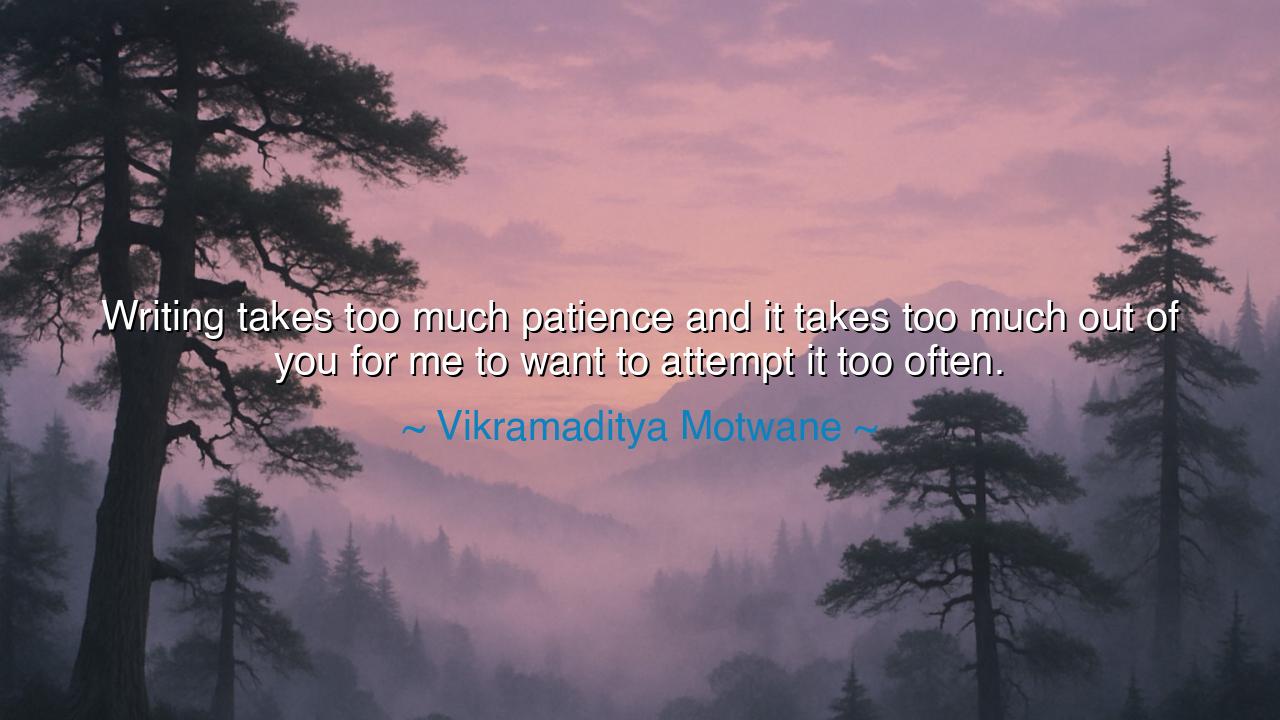
Writing takes too much patience and it takes too much out of you
Writing takes too much patience and it takes too much out of you for me to want to attempt it too often.






Hear the words of Vikramaditya Motwane, spoken with the honesty of a craftsman who has labored at his art: “Writing takes too much patience and it takes too much out of you for me to want to attempt it too often.” In this confession lies not weakness, but truth—truth about the hidden cost of creation. For to put words upon a page is not a mere act of leisure; it is the pouring out of the soul, drop by drop, until the heart grows weary. Writing is not simply the shaping of sentences, but the shaping of worlds, and such work demands more than talent: it demands endurance, sacrifice, and an inner fire that must often burn painfully.
The heart of his saying lies in patience, that long and grueling virtue without which no great work is born. To write is to sit before silence, struggling against doubt, chiseling thought into form. It is to revise again and again, to linger over each word until it feels alive. Many believe inspiration is enough, but Motwane speaks the truth: inspiration may begin the work, but only patience completes it. And this patience is not gentle—it wears on the spirit, tests the will, and often drains the one who dares to bear it.
The ancients knew well the burden of writing. Consider Homer, whose epic verses were not simply recited once but shaped through years of repetition, memory, and refinement. Or Virgil, who labored over the Aeneid until his dying breath, and even then begged that it be destroyed because it was, in his eyes, unfinished. Their greatness was not given easily; it demanded their strength, their health, even their peace. Motwane’s words are an echo of this eternal struggle—that art extracts its price, and the price is often steep.
Even in modern times, we see this truth lived out. Think of Franz Kafka, whose stories of alienation and despair drained his fragile health, so much so that he wished his works to be burned after his death. Or of Dostoevsky, who wrote under pressure of debt and illness, pouring his suffering into pages that would later be called immortal. Each of these proves that writing is not a light pastime, but a crucible, a place where the writer’s life is melted down to give shape to words that outlive him.
Yet within this burden lies also the nobility of the task. For though writing takes “too much out of you,” it also gives to the world something eternal. The patience spent, the strength drained, the years lost—they become immortal in the form of stories, ideas, and truths that inspire generations yet unborn. The writer may feel emptied, but his emptiness becomes the fullness of others. This is the paradox of creation: the artist gives until he is spent, and in being spent, he sows abundance for all.
The lesson, O seekers, is not that one should avoid writing or creation, but that one must approach it with reverence, knowing its cost. Do not expect it to be easy, nor to leave you untouched. Accept that true works of the spirit will demand your energy, your patience, and sometimes your very peace of mind. But also accept that this cost is what makes them precious. The mountain is high, the climb exhausting, but the view from its summit is eternal.
Practical counsel is this: if you choose the path of writing, prepare your heart for long labor. Do not grow disheartened when the work feels heavy, for heaviness is proof that you are carrying something of worth. Set aside time, protect your spirit, and remember to replenish yourself, so that your words may flow without destroying you. And if you do not write often, let that not be shame, but wisdom—choosing to give your strength when the story demands it most.
So let Motwane’s words stand as reminder and warning: “Writing takes too much patience, and it takes too much out of you.” Yes, it does. But from that sacrifice comes the immortal gift of art. To write is to give your breath so that others may breathe more deeply. And though it may cost the writer dearly, it enriches the world beyond measure.






AAdministratorAdministrator
Welcome, honored guests. Please leave a comment, we will respond soon